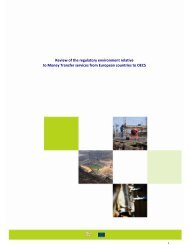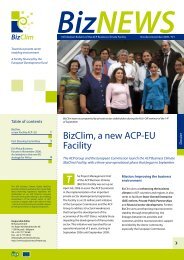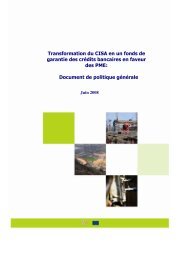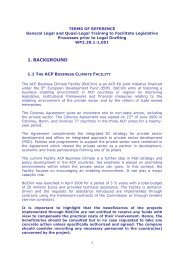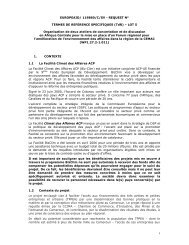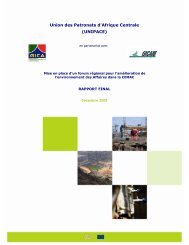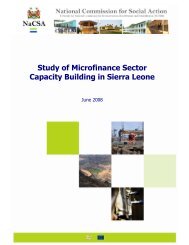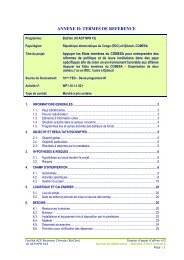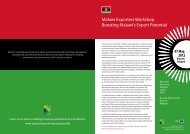(PPP) for Swaziland - ACP Business Climate
(PPP) for Swaziland - ACP Business Climate
(PPP) for Swaziland - ACP Business Climate
You also want an ePaper? Increase the reach of your titles
YUMPU automatically turns print PDFs into web optimized ePapers that Google loves.
<strong>Swaziland</strong>’s <strong>PPP</strong> Experience<br />
<strong>PPP</strong> expert Johan Kruger addressed the elaboration<br />
process and the content of <strong>Swaziland</strong>’s draft <strong>PPP</strong> policy.<br />
In 2008 the Government of the Kingdom of <strong>Swaziland</strong><br />
applied to BizClim <strong>for</strong> assistance to <strong>for</strong>mulate a <strong>PPP</strong><br />
policy. The objective was to develop a comprehensive,<br />
clearly articulated and pro-poor <strong>PPP</strong> policy accompanied<br />
by a framework in the <strong>for</strong>m of an operational<br />
manual to assist in structuring win-win <strong>PPP</strong> deals.<br />
The following steps were fixed <strong>for</strong> the development of<br />
the policy:<br />
1. Interviews of stakeholders (ministries, labour and<br />
private sector);<br />
2. Preparation of a Situation Report, followed by a<br />
consultation of stakeholders;<br />
3. Preparation of a draft Policy Framework, again<br />
followed by a consultation of stakeholders;<br />
4. Approval of the final <strong>PPP</strong> Policy by Government;<br />
5. reparation of an Operational Manual.<br />
The responsibilities were attributed to different ministries.<br />
A Public Enterprises Unit and Tender Board<br />
has been installed in the Ministry of Finance, while<br />
the Ministry of Economic Planning and Development<br />
is responsible <strong>for</strong> the coordination and management<br />
of Government’s capital programme. Line Ministries<br />
(Public Works, Health etc.) are in charge of identifying,<br />
designing and implementing the projects.<br />
Initially, the concept of <strong>PPP</strong> did not meet with uni<strong>for</strong>m<br />
approval in <strong>Swaziland</strong>. On the political level there were<br />
very high expectations, couple however with concerns<br />
that officials’ expertise to handle <strong>PPP</strong> projects was not<br />
sufficient. At the same time, some private sector stakeholders<br />
were concerned about the possible dominance<br />
of <strong>for</strong>eign companies. Labour feared negative consequences<br />
<strong>for</strong> workers, and parts of the financial sector<br />
did not see enough opportunities <strong>for</strong> <strong>PPP</strong> in <strong>Swaziland</strong>.<br />
Despite these concerns, there have been several small<br />
successful <strong>PPP</strong> projects. The most common problems<br />
were the lack of common understanding and coordination,<br />
insufficient planning capacity and structuring<br />
support, lack of capital and business training <strong>for</strong><br />
outsourced employees, limited possibilities <strong>for</strong> local<br />
participation, lack of competition (natural monopoly)<br />
and of political commitment to set cost recovery tariffs.<br />
To avoid these difficulties in future, regulations should<br />
be <strong>for</strong>mulated. Line departments need to operate<br />
within the policy guidelines, followed by a due process<br />
that will include the project in the public entity’s budget<br />
according to normal planning and budgetary guidelines<br />
and the completion of a proper feasibility study.<br />
It was also recommended that <strong>Swaziland</strong> create a <strong>PPP</strong><br />
technical assistance unit and a secretariat, regulate<br />
the approval process and delegations allow the use of<br />
transaction advisors, provide appropriate training,<br />
mandate the auditor general to monitor projects on<br />
a random to ensure the application of the value <strong>for</strong><br />
money principle, create opportunities <strong>for</strong> the local<br />
private sector and stipulate requirements <strong>for</strong> the<br />
involvement of local firms and private individuals.<br />
It is very important that the first pilot projects are successful<br />
as they lay the basis <strong>for</strong> further projects. They<br />
should have the strong support from all stakeholders<br />
and viable income streams and must not result in<br />
job losses or the necessity <strong>for</strong> substantial changes in<br />
conditions of service.<br />
<strong>PPP</strong>s require hard and consistent ef<strong>for</strong>t and cooperation<br />
between ministries but there are tremendous opportunities<br />
in the Kingdom.<br />
7



